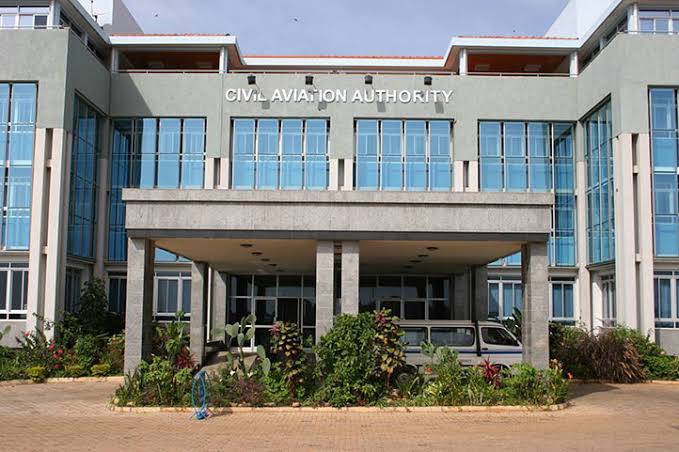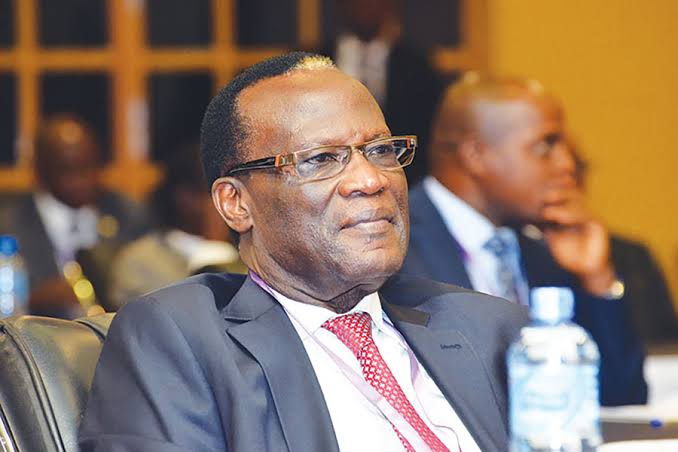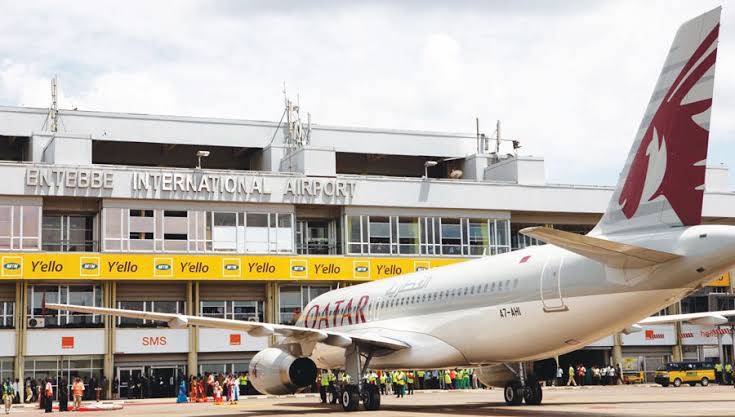
KAMPALA — An Investigation by the East African Center for Investigative Reporting’s online publication Vox Populi has put the management of Uganda Civil Aviation Authority (UCAA) on the spotlight amid allegations of corruption in the implementation of four major projects at Entebbe International Airport.
CAA is the country’s aviation regulator, manages Entebbe International Airport and a host of civilian airports and aerodromes including tourist airfields such as Pakuba in Murchison Falls National Park and the main airstrip in Kidepo Valley National Park in Karamoja.
The organization is carrying out four major projects aimed at changing the face and structure of the country’s flagship airport.
The projects which involve billions of Ugandan shillings are expansion of the Karibuni Project, which entails adding an extra floor on the existing passenger terminal building, the Entebbe Airport Expansion Project, expansion of the passenger terminal building and construction of a search park.
A dossier which was sent to the office of the President by a whistleblower calling for an investigation into the goings on at CAA suggests that there has been grand scale corruption in the implementation of all the projects, which has led to delays in completion of works and the loss of public funds.
“No single major project has been within the stipulated time and cost. Variations have become the norm leading to loss of public funds,” the whistleblower wrote.
Karibuni lounge
The whistleblower’s document suggests that the cost of expanding the construction of additional offices on the third floor of the passenger terminal building at the airport is being implemented at a grossly inflated cost.
The management submitted a proposal in which it sought to embark on this project which it claimed would address space congestion in the transit and departure lounges, but Vox Populi has established that the immediate former Board of the organization had earlier vetoed it.
The Chairman of the Board led by Edward Mike Ndawula deemed it a waste of much needed meagre resources given the financial difficulties that beset CAA following the international air travel restrictions that came into force following the outbreak of the Covid-19 pandemic.
Three different sets of minutes of meetings of the Board including those of its last meeting held on May 14, 2020, three days before its term of office drew to a close, indicate that the board had termed the project as a “non-priority”.
The board’s minutes also indicate that it had actually slapped a ban on all the implementation of projects until after government and CAA had found a way of dealing with Covid-19 and its effects on the organization and the national economy.
“No new projects should be implemented in the period in order to save resources to cater for the staff since our revenues have been greatly affected by the suspension of commercial passenger flights,” read one of the minutes of the meeting of May 14.
Besides the need to save funds the board also had technical concerns about the project. It was concerned that no risk assessment and stakeholder engagements were carried out as required of such projects. Studies had not been carried out to ascertain the structural integrity of the old existing structure.
Vianney Mpungu Luggya, the Manager Public Affairs at CAA however argues that two different consultancy firms had carried out structural integrity reports on the passenger terminal building and given the plan a clean bill of health.
“Teclab Limited and Ssentoogo and Partners did studies and all the two reports conclude a satisfactory structural integrity of the building,” Mr Luggya said.
One of the other reasons for the Ndawula led board’s decision to vetoe the project was that it would render the runway 12-30 unserviceable. They argued that it would block the air traffic controllers’ line of sight.
“There is no extra floor in this project and in any case, the added offices will in no way block visibility of runway 12-30. The line of sight from the Control Tower is therefore not to be obstructed as insinuated in the allegations,” Mr Luggya argued.
Information available to Vox Populi indicates that the management hastily awarded the tender to Seyani Brothers & Co. Limited as soon as the Ndawula board’s term of office expired and before the appointment of a new board. The board’s term of office ended on May 17, 2020. A new board of directors led by former Deputy Chief Justice, Steven Kavuma was named on June 3, but it was not until its inauguration on June 24 that it assumed office.

The rest of the members of the Justice Kavuma led board are Moses Paul Lubowa, Zubair Musoke, Angela Kiryabwire Kanyima and James Kubeketerya. Others are Ethel Kamba, Dr. Alayo Ocero and Thomas James Kiggundu.
The question now is why the management under the acting Director General, Fred Bamwesigye, did not wait for a new board to be appointed before proceeding with a project that had been vetoed by the previous board.
The manner in which the tender was awarded has also come under scrutiny amid allegations that the decision to award the contract for the Shs10 billion project did not follow normal procedures provided for under the Public Procurement and Disposal of Public Assets (PPDA) Act.
Luggya did not say why the decision of the former Board had been set aside and a contractor named before a new board could take office. He however insisted that the project had been subjected to a competitive bidding process that arrived at Seyani Brothers as the contractor of choice.
“The project was tendered and a number of companies competed. However, Seyani Brothers came out as the lowest economic best evaluated bidder at a cost of 10.5 billion Uganda Shillings,” Luggya said.
Mr Luggya also insisted that the project was necessary.
“The most constrained of all the facilities (Entebbe Airport) are the departure lounges. On many occasions the airport would suffer congestion on departure, especially during peak hours, which would downgrade the service level. It was therefore deemed necessary to expand on the lounges area by removing Karibuni lounge from its current location to the second floor and use its current location to facilitate departing passengers,” Luggya said.
He added that expansion will increase space and enable Entebbe to comply with departure, waiting and boarding areas in adherence to the physical and social distancing regulations prescribed by the World Health Organization (WHO) and the International Civil Aviation Organization (ICAO).

Entebbe Airport Expansion
According to the whistleblower’s dossier, the project which was intended to expand the airport, which is being implemented with funds borrowed from the Exim Bank of China is being carried out in a manner that will later facilitate fraud.
“Some key components of the Project like the freighters house to operationalise the Cargo centre were intentionally left out in order to be handled as a separate project for obvious reasons,” the dossier read in parts.
Luggya however insists that the cargo center has been designed as a cargo complex with an own cargo building, which is separate from other facilities at the airport.
“The concept now being pursued is a cargo commercial centre that has freighters offices, banks, and shopping centres, key government bodies involved in the cargo facilitation process, ATM facilities and restaurants. This is a more robust way of facilitating cargo operations in a much secure environment with restricted access to the area where cargo is being held,” Luggya said.
Extension of Passenger Terminal Building
The dossier to the President also raised questions about the cost and manner in which the project is being executed.
The contract for the project was awarded to Seyani Brothers in 2017 at a cost of Shs.40 billion and was meant to be completed within 17 months, but has seen the cost of the project rise to Shs.48 billion yet it has fallen several months behind schedule due to what the whistleblower termed as incompetence and corrupt tendencies.
“The project cost has escalated to Shs. 48 billion and to date the project is below 60% completion way out of the initial timeline. Your Excellency to put this in perspective, URA built an 18-floor building at a cost of Shs. 139 billion which loosely translates to Shs. 7.7 billion per floor. UCAA is constructing a three-floor block at Shs. 48 billion which translates to Shs. 16 billion per floor,” the whistleblower says.
This is not the first time that issues around the cost and execution of the project are coming into question.
The Auditor General in his report on financial statements of CAA for the financial year ending June 2019 showed that the cost of the project had shot up to Shs. 42.6 billion yet physical progress stood at 42 percent. The report also points at excess payments that CAA had made to the contractors without any justifications.
“The review of the payments revealed that the Project Manager sanctioned a payment of Shs. 494,909,091 as running expenses to the contractor for the period July 2016 to February 2017 yet no works were executed in this period since the contractor did not have access to the site,” the Auditor General‘s report reads in part.

The report also indicated that another Shs. 295 million was paid to Seyani Brothers as costs due to the extension of time, but that the payment was in contravention of a decision of both the board and the Contracts Committee which had vetoed any payments on account of any extension.
Luggya however insists that the delays in completion was caused by various changes made to the initial designs.
“At the time of implementation, the design was changed, and another floor was introduced to provide space for the national airline, and other offices. In addition, an Access Road was introduced and the floor area increased, among other changes. In a nutshell, besides having gone through a competitive bidding process, the specific project components are different from the other project being compared,” Luggya contended in an interview.
He hastened to add that work is on course and about 75 percent complete. He says that CAA took advantage of the lockdown and suspension of flights to rehabilitate runways and associated taxiways.
Search Park
In the dossier to the office of the President, the whistleblower claims that the Search park which is critical to the security of the airport is not functional and has no equipment, a scenario that the whistleblower attributed to incompetence on the part of the management.
Luggya however says that the situation has nothing to do with CAA. He points in the direction of the central government.
“The equipment and facilities to be used in the Search Park were part of an Integrated Security project, which was part of a bigger Government of Uganda project that is yet to be executed,” he says.
It was not possible to establish from Lt. Col. Edith Nakalema, the head of State House’s Anti-Corruption Unit on how far the investigation has progressed. A call to the State House switchboard was registered with a promise to call Vox Populi back but that promise was not honoured.
=================================
This story was first published by the East African Center for Investigative Reporting’s online publication Vox Populi. PML Daily has been authorized to publish this story under the Center’s Collaborative Investigative Journalism Initiative.





